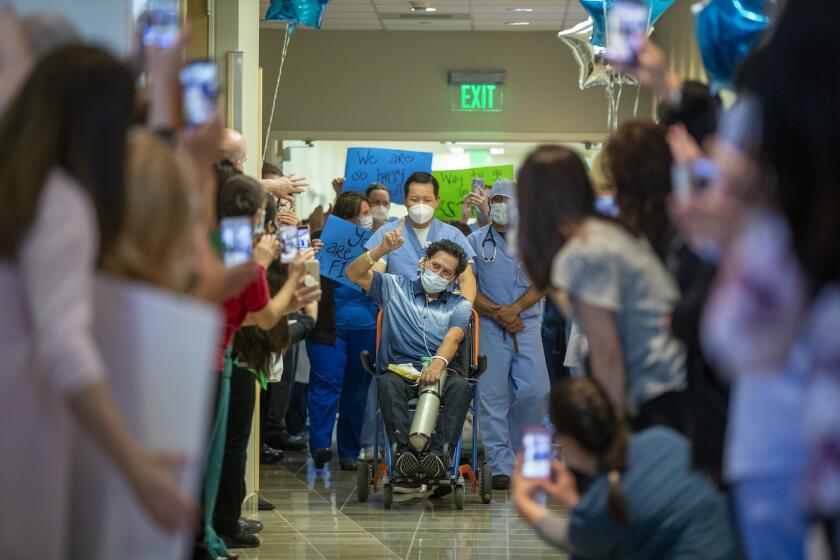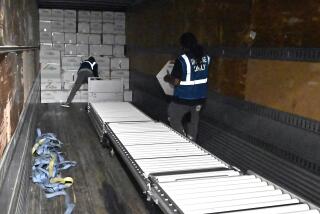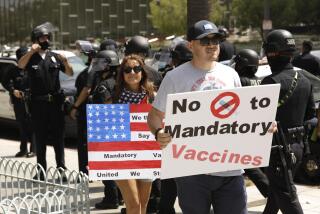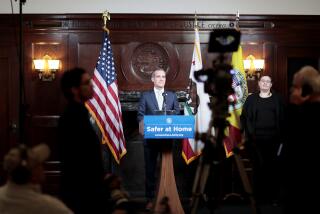States do battle for coronavirus protective gear in a market driven by chaos and fear
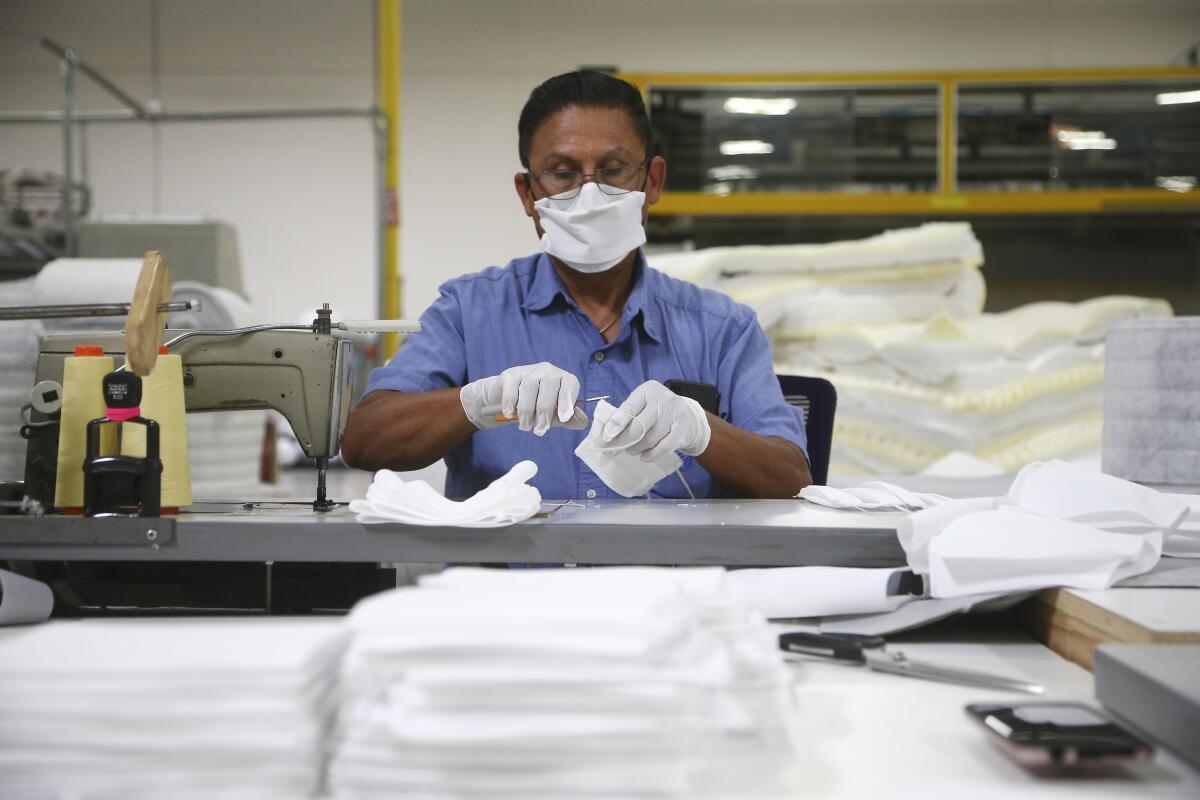
The text messages and emails come in the middle of the night from strangers claiming to be middlemen and manufacturers. Deals are cut quickly; millions of dollars are wired overseas. Sometimes the supplies arrive; other times, the too-good-to-be-true offers prove to be just that.
When President Trump told governors last month that the federal government was “not a shipping clerk,” he left states and local governments to fend for themselves in a global market for protective gear in which sellers have all the power, and confusion and chaos dominate.
In interviews, state and local officials around the country depicted a market that even the most seasoned say has astonished them by its logistical challenges, lack of transparency, and potential for fraud.
Prices of surgical gowns, gloves and N95 masks have skyrocketed. The masks, which used to sell for between 50 cents and a dollar apiece, are now on offer for $5 or $6, officials said.
Government employees have been told that if they don’t pay 50% of the cost upfront, and the rest before the shipment has even arrived, they will lose deals to other bidders. Fearful of having orders seized by the federal government, desperate city and state officials have called members of Congress and other elected officials to ask them to sweet-talk U.S. customs officials.
The experience has been an emotional roller coaster for state and city officials. Working on the scantest of information and often with brand-new suppliers, they have had to disregard longstanding rules in order to act quickly. Too much hemming and hawing, and they could wind up with nothing to show for their efforts.
But without careful investigation, they might buy defective equipment, endangering hospital workers, police officers and paramedics.
“It has been crazy,” Illinois Assistant Comptroller Ellen Andres said.
Late last month, working through a broker, officials in her state thought they had secured 1.5 million N95 respirator masks, only to learn that they would lose the first shipment to another bidder if they didn’t pay within 24 hours. With a check for $3.5 million in hand, Andres sped north in her car from Springfield, Ill., to meet the broker at a McDonald’s parking lot. She completed the transaction with little time to spare.
“By doing things this way, we are driving up costs for taxpayers,” Andres said. “We have lost ventilators, at the last minute, to the state of New York. And I know that Illinois has probably swooped in on some other states. It’s not the way to do this.”
These are some of the unusual new scenes across the Southland during the coronavirus outbreak.
One of the many hurdles states face is the emergence of middlemen and brokers who hold themselves out as specialists in connecting American buyers to foreign manufacturers. Some are legitimate actors working around the clock to track down supplies; other are opportunists cashing in on a global pandemic.
The task of telling them apart has fallen to hundreds of government procurement employees who are trained to take their time and typically have little experience navigating China’s manufacturing industry.
To protect themselves from fraud, some states and cities have refused to work with sellers they don’t know or those who demand payment upfront. Others said they don’t have that luxury.
In late March, when Nevada’s governor realized the federal government was not coming to his aid, he assembled a public-private task force to scour the globe for masks, goggles and surgical gowns. Headed by former MGM Resorts Chief Executive Jim Murren, the COVID-19 Response, Relief and Recovery Task Force drew on the connections of the state’s politicians, casino moguls and Nevada’s largest electric utility, NV Energy.
Armed with health officials’ wish list, the group has chased leads all over China, competing with larger states, hospital chains and, at one point, the second most populous country in the world — India.
“The market is completely opaque,” said task force member Alex Dixon, who leads West Coast operations for PureStar, a major linen supplier to Vegas hotels.
“This is in many cases dealing with several middle people who then have another relationship who has a relationship with someone in China, who then has a relationship with an actual manufacturer,” he said. “Whenever you get a lead, you’re like, ‘Hold on, who’s the actual person producing this?’”
To avoid scams, the Nevada task force runs all purchase orders through state health officials and checks potential respirator shipments against the Centers for Disease Control and Prevention’s list of counterfeit face masks. Dixon said the group encounters fake or unapproved personal protective equipment, known as PPE, every day.
Had the federal government taken charge, centralizing the entire process, the result might have been less chaotic, Dixon believes. Fewer competitors in the market would have meant fewer transactions and less room for error.
“All of us on the task force want to be engaged and involved. It’s meaningful work. It’s great,” he said. “But at some point you kind of shake your head and say, ‘There’s a better way to do this.’”
Governors nationwide have asked Vice President Mike Pence, who is heading the Trump administration’s response to the coronavirus outbreak, to put the Federal Emergency Management Agency in charge of buying protective gear and distributing it. They have argued that having only one customer on the market would eliminate bidding wars between states and local governments.
“The vice president made it clear in a very nice way that that’s not going to happen,” said Kansas Gov. Laura Kelly.
In an interview with The Times, Kelly said the administration’s management of the outbreak has hurt states where hospitalizations and deaths are relatively low compared with hot spots like New York and New Jersey, but where essential employees need masks and gloves in order to work.
“We’ve been hit less hard, but that doesn’t mean we have people here who don’t matter,” she said.
Some governments and hospitals have hired lawyers and consultants to help them vet suppliers.
Hartford HealthCare, a network of seven hospitals in Connecticut, is working with Dan Harris, an attorney who specializes in doing business with China, to help verify potential brokers. Since the pandemic unfolded, Harris said his inbox has been flooded with dubious would-be brokers and middlemen looking to offload supplies.
Harris said he suspects that the rising cost of medical supplies is mostly a result of price gouging and profiteering, not an increased cost of doing business. Prices are expected to continue to increase following new export protocols enacted by the Chinese government this month, which will likely limit the number of companies cleared to send medical goods to the U.S.
“Every hospital is dealing with this on their own, there’s really no coordinated effort to weed out these bad actors,” said Dan C. Pak, the network’s vice president overseeing procurement, who has been calling Chinese factories to vet his orders with middlemen. “We are literally at the mercy of these brokers.”
Wholesale prices of medical supplies have increased across the board. But state and city officials said they have encountered the most exorbitant price hikes in the market for N95 face masks, which are considered the most protective for medical workers.
Once supplies are found and checks cut, officials said they still can’t be sure the goods will arrive. Some vendors diligently update states and cities at each point in the process; others have left officials in the dark.
Unable to keep up with ever-increasing demand, some manufacturers have shipped orders that are only partially complete and promised to send the rest in coming days or weeks.
“A vendor might tell you that you’ll get the shipment on April 9th, and then on April the 6th they call and say, ‘Well, we had a little problem.’ Or, ‘The federal government took over your order,’” Phoenix Assistant City Manager Milton Dohoney Jr. said.
Amid all the uncertainty, the city’s procurement employees spend every day trying to run down leads on supplies, execute orders and verify that the shipments have reached the city’s warehouse. They demand to see suppliers’ tax identification numbers and call around to other cities and states to check on vendors’ reputations.
Even then, Dohoney said, they can never be absolutely certain that what they paid for is what they’ll get. Phoenix recently ordered a shipment of N95 masks that, on arrival, turned out to be of lesser quality, he said.
“I was just told that we’ve gotten some product, and it wasn’t at the standard we thought it was going to be,” he said. “You just don’t know what’s going to happen.”
Have a tip or story idea about states, cities and hospitals competing to purchase medical supplies? Message us at https://www.latimes.com/tips/
More to Read
Get the L.A. Times Politics newsletter
Deeply reported insights into legislation, politics and policy from Sacramento, Washington and beyond. In your inbox three times per week.
You may occasionally receive promotional content from the Los Angeles Times.
